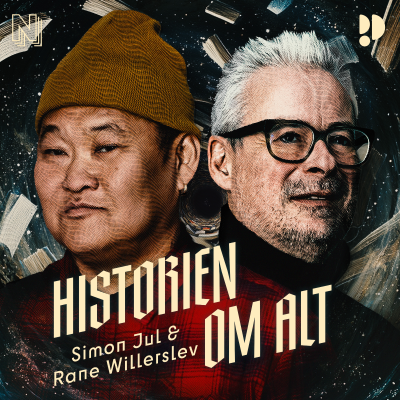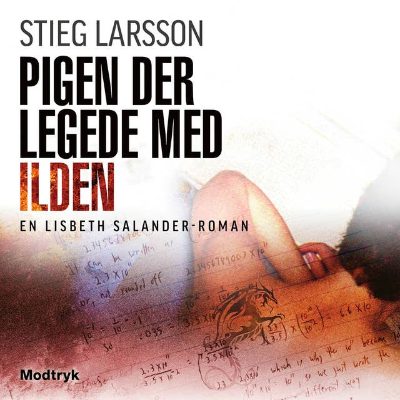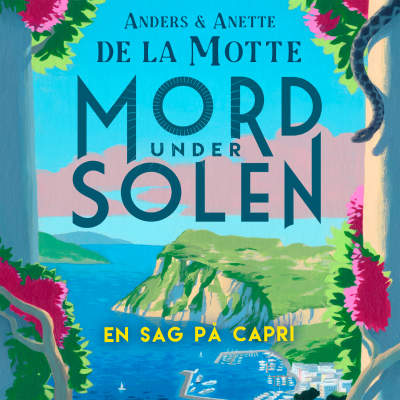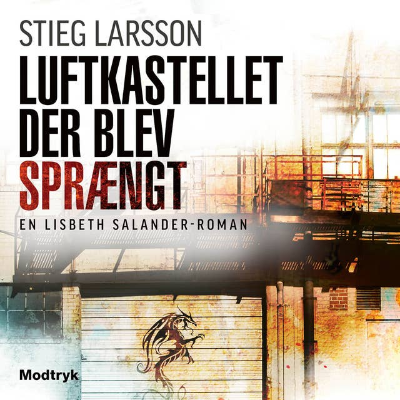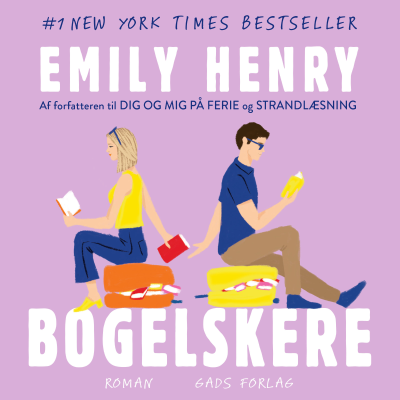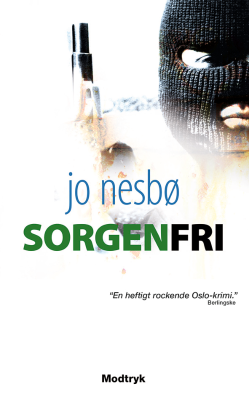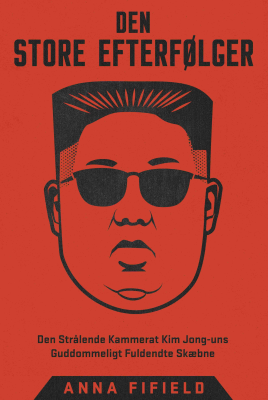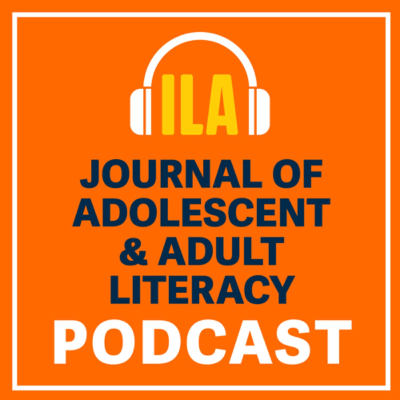
Journal of Adolescent & Adult Literacy Podcast
Podcast af JAAL
Prøv gratis i 7 dage
99 kr. / måned efter prøveperioden.Ingen binding.

Mere end 1 million lyttere
Du vil elske Podimo, og du er ikke alene
Rated 4.7 in the App Store
Læs mere Journal of Adolescent & Adult Literacy Podcast
Journal of Adolescent & Adult Literacy podcast delivers current theory, research, and practice in support of effective literacy instruction. During each episode, Matt Sroka invites a guest from the literacy field to delve into practical concepts for enhancing literacy teaching.
Alle episoder
46 episoderRead STOP Write with Drs. John Strong and Laura Tortorelli In this episode of the Journal of Adolescent & Adult Literacy podcast, host Matt Sroka welcomes Dr. John Strong and Dr. Laura Tortorelli to discuss their article, Read STOP Write: Teaching foundational skills in a multicomponent informational reading and writing intervention [https://ila.onlinelibrary.wiley.com/doi/10.1002/jaal.1389] written by John Z. Strong, Laura S. Tortorelli, and Blythe E. Anderson Strong and Tortorelli explore the design and impact of Read STOP Write, an intervention developed to support upper-elementary and middle grade students in building foundational reading and writing skills through a multicomponent approach. The intervention integrates multisyllabic decoding, fluency, and vocabulary with strategies for comprehending and writing about informational texts. Dr. John Z. Strong is Assistant Professor of Literacy Education in the Graduate School of Education at the University at Buffalo. He is also Associate Director of Research in the Center for Literacy and Reading Instruction and Co-PI in the Center for Early Literacy and Responsible AI. His research focuses on developing and testing reading and writing interventions to support students’ foundational reading skills and comprehension of complex texts. A former high school English language arts teacher, he is coauthor of professional books on literacy instruction in grades 4-12 and has published in leading journals. He has served as associate editor of The Reading Teacher and serves on the editorial review boards of leading journals, including Journal of Adolescent & Adult Literacy. Dr. Laura Tortorelli is an Associate Professor of Elementary Literacy in the Department of Teacher Education at Michigan State University. Tortorelli's research focuses on the texts, technologies, and evidence-based practices for developing foundational reading and writing skills. She also teaches future teachers how to teach reading in Michigan State’s #1 ranked elementary education program. Her work has been funded by the Institute for Education Sciences, the National Science Foundation, the Spencer Foundation, the Advanced Education Research and Development Fund, and the International Literacy Association. Her current projects focus on supporting informational text reading and writing in 4th and 5th grade and integrating AI into early reading instruction. Resources: Read STOP Write: Teaching foundational skills in a multicomponent informational reading and writing intervention [https://ila.onlinelibrary.wiley.com/doi/10.1002/jaal.1389] https://www.readstopwrite.com/ [https://www.readstopwrite.com/]
Redefining and Reimagining Foundational Skills with Dr. Abigail Amoako Kayser and Katie Keown In this episode of the Journal of Adolescent & Adult Literacy Podcast, host Matt Sroka welcomes Dr. Abigail Amoako Kayser and Katie Keown for a conversation about their article on culturally and linguistically sustaining approaches to foundational skills instruction. Dr. Kayser and Keown discuss how students’ home languages, dialects, and cultural knowledge are too often overlooked in literacy instruction. Together, they explore how classroom teachers can design joyful, rigorous instruction that honors students’ full linguistic repertoires while building the knowledge needed to access complex academic texts. This conversation is based off the JAAL article: Redefining and reimagining foundational skills: Centering joyful, culturally, and linguistically sustaining instruction in literacy instruction for CLD students [https://ila.onlinelibrary.wiley.com/doi/10.1002/jaal.1411] written by Abigail Akosua Amoako Kayser, Katie Keown, Carey Swanson, Madeleine Mejia, and Brian Kayser. Katie Keown serves as a Literary Director at Student Achievement Partners, a nonprofit focused on improving student outcomes by ensuring all children receive equitable and essential instruction. Her work focuses on the organization’s secondary literacy initiatives, including teacher training and aligning systems to ensure all students receive the high-quality reading instruction they deserve. Prior to her time at SAP, she worked on the assessment team at HMH-Riverside and taught middle and high school students in Illinois and Mississippi. Katie is currently in the Reading Science doctoral program at Mount St. Joseph University, where her research interests include adolescent literacy and teacher preparation. She holds a Master’s in Reading Science from the Mount and a Bachelor’s in English from the University of Illinois. Abigail A. Amoako Kayser, Ph.D. is an Associate Professor in the Department of Early, Elementary, and Reading Education at James Madison University. She is a Fulbright Scholar and a former elementary school teacher. Her research explores how educators can engage in practices that promote equitable, joyful literacy development in culturally and linguistically sustaining ways for students in both the United States and Ghana. Primary Resources: Special Issue: Foundational Skills in Adolescent Literacy [https://ila.onlinelibrary.wiley.com/toc/19362706/2025/68/4] Redefining and reimagining foundational skills: Centering joyful, culturally, and linguistically sustaining instruction in literacy instruction for CLD students [https://ila.onlinelibrary.wiley.com/doi/10.1002/jaal.1411] Additional Resources: IES Guide for Providing Reading Interventions for Students in Grades 4-9 [https://ies.ed.gov/ncee/wwc/practiceguide/29] Writing to Read: Evidence for How Writing Can Improve Reading [https://www.carnegie.org/publications/writing-to-read-evidence-for-how-writing-can-improve-reading/] Increasing reading Fluency for Middle and High School Students [https://achievethecore.org/page/3254/increasing-reading-fluency-for-middle-and-high-school-students] Bronfenbrenner's Ecological Theory [https://onlinelibrary.wiley.com/doi/abs/10.1002/9781119171492.wecad251] Funds of Knowledge: Theorizing Practices in Households, Communities, and Classrooms [https://www.taylorfrancis.com/books/edit/10.4324/9781410613462/funds-knowledge-norma-gonzalez-luis-moll-cathy-amanti?context=ubx&refId=4eede073-c7bb-4738-b4fa-8d1aaa8b63a4]
Word-Level Reading Skills for Adolescent Learners with Dr. Brennan Chandler Welcome to the Journal of Adolescent & Adult Literacy Podcast! I’m your host, Matt Sroka, and today’s episode as promised continues a series of episodes on the foundational literacy skills for adolescents. These discussions will be taken from a recent special issue of The Journal of Adolescent & Adult Literacy, which explores supporting adolescent readers' foundational literacy skills. Last episode I talked with the editors of this special issue. Today, I welcome my first author from this special issue Dr. Brennan Chandler. As students progress into middle and high school, the expectation is that they can independently engage with complex texts. However, for students with or at risk for learning disabilities (LD), decoding multisyllabic words remains a significant challenge, often hindering their ability to access content knowledge and read for understanding. In this episode of the Journal of Adolescent & Adult Literacy podcast, host Matt Sroka welcomes Dr. Brennan Chandler to discuss the importance of word reading efficiency, the unique challenges faced by secondary students with LD, and the instructional strategies that can help bridge this gap. This conversation is based on the article written for JAAL titled: Instruction to Support Word-Level Reading Skills for Adolescent Learners with Learning Disabilities [https://ila.onlinelibrary.wiley.com/doi/10.1002/jaal.1399] written by Brennan W. Chandler, Jessica R. Toste, Elizabeth J. Hart, and Devin M. Kearns. Brennan Chandler is an assistant professor of dyslexia and special education in the Department of Learning Sciences at Georgia State University. He received his Ph.D. in Special Education from The University of Texas at Austin with a focus on learning disabilities. His research focuses on improving outcomes for students with dyslexia and other significant reading and writing disabilities through developing, testing, and implementing intensive interventions. Resources: SPECIAL ISSUE: FOUNDATIONAL SKILLS IN ADOLESCENT LITERACY [https://ila.onlinelibrary.wiley.com/toc/19362706/2025/68/4] Instruction to Support Word-Level Reading Skills for Adolescent Learners with Learning Disabilities [https://ila.onlinelibrary.wiley.com/doi/10.1002/jaal.1399]
Foundational Skills in Adolescent Literacy with Drs. Sarah Sarah Lupo, Dianna Townsend, Rachel Knecht, and Dixie Massey In today’s episode, host Matt Sroka welcomes Drs. Sarah Lupo, Dianna Townsend, Rachel Knecht, and Dixie Massey, guest editors of a special issue of The Journal of Adolescent & Adult Literacy on Foundational Skills in Adolescent Literacy. They discuss the motivation behind the special issue, the collaborative process of putting it together, and key themes that emerged. This conversation centers on their introductory commentary, Recognizing Complexity and Taking Action: Supporting Adolescents' Foundational Literacy Skills in Culturally and Linguistically Sustaining Ways [https://ila.onlinelibrary.wiley.com/toc/19362706/2025/68/4] Sarah M. Lupo, Ph.D., is an Associate Professor of Literacy Education in the Middle, Secondary, and Mathematics Department at James Madison University. Prior to working at JMU, she worked as an English teacher, ESL teacher, reading specialist, and literacy coach in Washington D.C., Istanbul, Turkey, Phoenix, AZ, and Charlottesville, VA. Her research strives to put theory into practice to find practical ways teachers can improve comprehension and disciplinary learning for K-12 students, while positioning all learners’ as capable and bringing cultural and linguistic assets to the reading experience. Dr. Dianna Townsend’s research centers the language development of adolescents, with specific attention to vocabulary. She examines both the unique language demands of the disciplines and effective instructional strategies to help students understand and use the language of the disciplines. Her most recent book is Words Worth Using: Supporting Adolescents’ Power with Academic Vocabulary, published by Teachers College Press in 2022. Dr. Townsend’s research has been funded by the Spencer Foundation and the Institute of Education Sciences at the U.S. Department of Education. She is also a member of the Reading Standing Committee for the National Assessment of Education Progress (NAEP). In Nevada, Dr. Townsend is the co-founder and President of the Nevada Adolescent Literacy Network (NALN) and a lead author of the Nevada State Literacy Plan. Dianna is a winner of the University of Nevada Reno’s Tibbetts Distinguished Teacher Award. She created the innovative Virtual Reading Clinic in the online M.Ed. Program in Reading Curriculum & Instruction to support remote and rural teachers in a graduate-level practicum experience. Within the College of Education and Human Development at UNR, Dr. Townsend is the Program Coordinator of the Literacy Studies Program. Dr. Dixie Massey teaches at Seattle Pacific University. Her research interests include the role of motivation in literacy learning, the history of literacy instruction, and teacher decision making. She is co-author of Teaching with children’s literature: From theory to practice and Overcoming Reading Challenges: Kindergarten through Middle School. She is a contributing author for the Social Studies Schools Services. She has served as historian for the Literacy Research Association and the Association of Literacy Educators and Researchers and currently chairs the History of Literacy ICG for the Literacy Research Association. Rachel Knecht is an Assistant Professor of English Teaching at Brigham Young University. A former middle and high school ELA teacher, Rachel’s research focuses on supporting upper elementary and secondary students' reading comprehension, particularly through metalinguistic development. Rachel is also interested in cultivating dialogical spaces and instructional approaches in which students can draw on their cultural and linguistic resources and further develop metalinguistic awareness to comprehend and critically examine text. She is also committed to research-practice partnerships with public schools. Resources: Special Issue: Foundational Skills in Adolescent Literacy [https://ila.onlinelibrary.wiley.com/toc/19362706/2025/68/4] Recognizing Complexity and Taking Action: Supporting Adolescents' Foundational Literacy Skills in Culturally and Linguistically Sustaining Ways [https://ila.onlinelibrary.wiley.com/toc/19362706/2025/68/4]
Think Like a Linguist with Dr. Amy Crosson In today’s episode, host Matt Sroka welcomes Dr. Amy Crosson for an in-depth conversation on vocabulary instruction for multilingual students. They explore her research on academic vocabulary and word analysis through Latin roots, highlighting strategies that empower students to draw on their linguistic knowledge. This episode provides valuable insights into how teachers can harness students' diverse language backgrounds to deepen their understanding and appreciation of words.The discussion centers on the Journal of Adolescent & Adult Literacy article, “Think Like a Linguist: Leveraging Multilingual Students’ Expertise about Language”. [https://ila.onlinelibrary.wiley.com/doi/10.1002/jaal.1226] Amy Crosson is an associate professor at Penn State’s College of Education and is a faculty affiliate of the Center for Language Science at Penn State. She started her career teaching English as a Second language in a middle school in rural Guatemala and then as a bilingual Spanish-English kindergarten teacher in urban school districts in Massachusetts. Amy’s research focuses on developing and evaluating instructional programs that are designed to improve and accelerate learning for multilingual learners in public school settings. Her work has focused on supporting multilingual learners (1) to sharpen their metalinguistic and language awareness, (2) to utilize their metalingual resources; (3) to engage in oral and written argumentation; and (4) to read with understanding. In addition to the JAAL article on “Think Like a Linguist”, she and her colleagues recently published an article on the instructional program-- English Learners’ Robust Academic Vocabulary Encounters (EL RAVE)-- that gave rise to Think Like a Linguist. That article addresses the effects of Think Like a Linguist and the overall EL RAVE instructional program on multilingual adolescents’ language and reading outcomes. You can read about that in the journal, Scientific Studies of Reading (2025). Article: “Think Like a Linguist: Leveraging Multilingual Students’ Expertise about Language” [https://ila.onlinelibrary.wiley.com/doi/10.1002/jaal.1226] Other Related Resources: EL RAVE Website: https://sites.psu.edu/elrave/ [https://sites.psu.edu/elrave/] Words as Tools: https://ies.ed.gov/use-work/awards/words-tools-vocabulary-development-emergent-bilinguals-science-and-beyond?ID=5857 [https://ies.ed.gov/use-work/awards/words-tools-vocabulary-development-emergent-bilinguals-science-and-beyond?ID=5857] Carlson, M. & Crosson. (2025). The synchronic status of historical bound roots in the mental lexicon: A dynamic, psychocentric perspective. The Mental Lexicon. Crosson, A.C., Kieffer, M.J., McKeown, M.G., & Nagy, W. (2025). Cross-language morphological analysis improves academic word learning for multilingual adolescents. Scientific Studies of Reading [Special issue on the science of teaching reading.] 10.1080/10888438.2024.2415916 Crosson, A.C. & Silverman, R.D. (2022). Impact of COVID‐19 on early literacy instruction for emergent bilinguals, Reading Research Quarterly, 57. 5-14. 10.1002/rrq.456 Crosson, A.C., McKeown, M.G., Lei, P., Zhao, H.*, Li, X.*, Patrick, K. & Brown, K. & Shen, Y.* (2021). Morphological analysis skill and vocabulary knowledge are malleable through intervention and may contribute to reading comprehension for multilingual adolescents. Journal of Research in Reading, 44, 154-174. 10.1111/1467-9817.12323 {Winner of the 2022 United Kingdom Literacy Association/Wiley Research in Literacy Education Award] Crosson, A.C., McKeown, M.G., Robbins, K. & Brown, K. (2019). Key elements of robust vocabulary instruction for emergent bilingual adolescents. Language, Speech, and Hearing Services in Schools, 50, 493-505. 10.1044/2019_LSHSS-VOIA-18-0127 Crosson, A.C., McKeown, M.G., Moore, D.W. & Ye, F. (2019). Extending the bounds of morphology instruction: Teaching Latin roots facilitates academic word learning for English learner adolescents. Reading and Writing, 32, 689–727. 10.1007/s11145-018-9885-y

Rated 4.7 in the App Store
Prøv gratis i 7 dage
99 kr. / måned efter prøveperioden.Ingen binding.
Eksklusive podcasts
Uden reklamer
Gratis podcasts
Lydbøger
20 timer / måned



